Contemporary Hospitality Industry
VerifiedAdded on 2023/01/23
|14
|4464
|32
AI Summary
This document provides an overview of the contemporary hospitality industry, including various businesses and services offered. It discusses the range of operational and functional departments within organizations, as well as the contribution of the hospitality industry to local, national, and international economies. The document also explores the different operational roles within the industry and the skills required for these roles. Additionally, it examines the impact of macro-environmental factors on the hospitality industry.
Contribute Materials
Your contribution can guide someone’s learning journey. Share your
documents today.
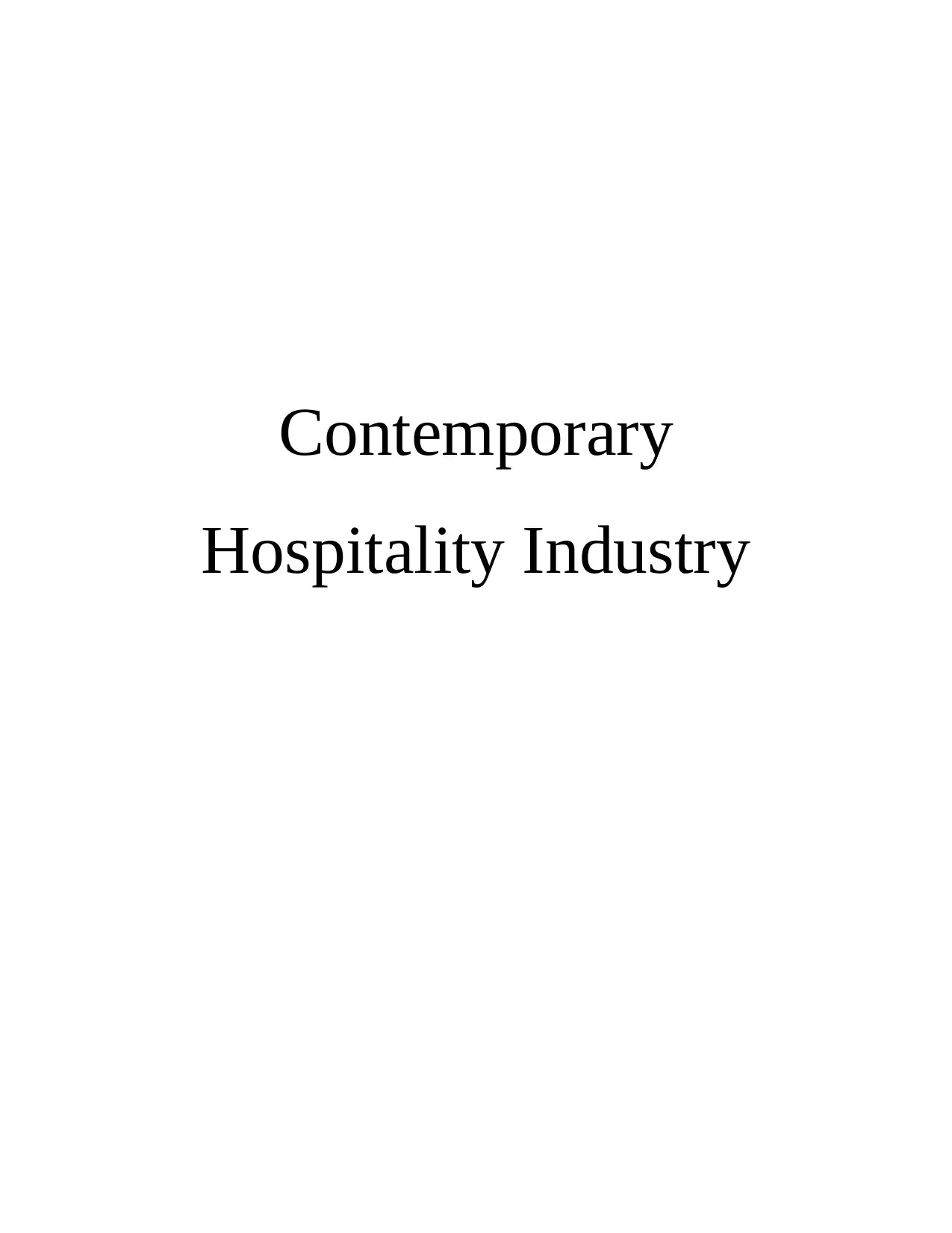
Contemporary
Hospitality Industry
Hospitality Industry
Secure Best Marks with AI Grader
Need help grading? Try our AI Grader for instant feedback on your assignments.
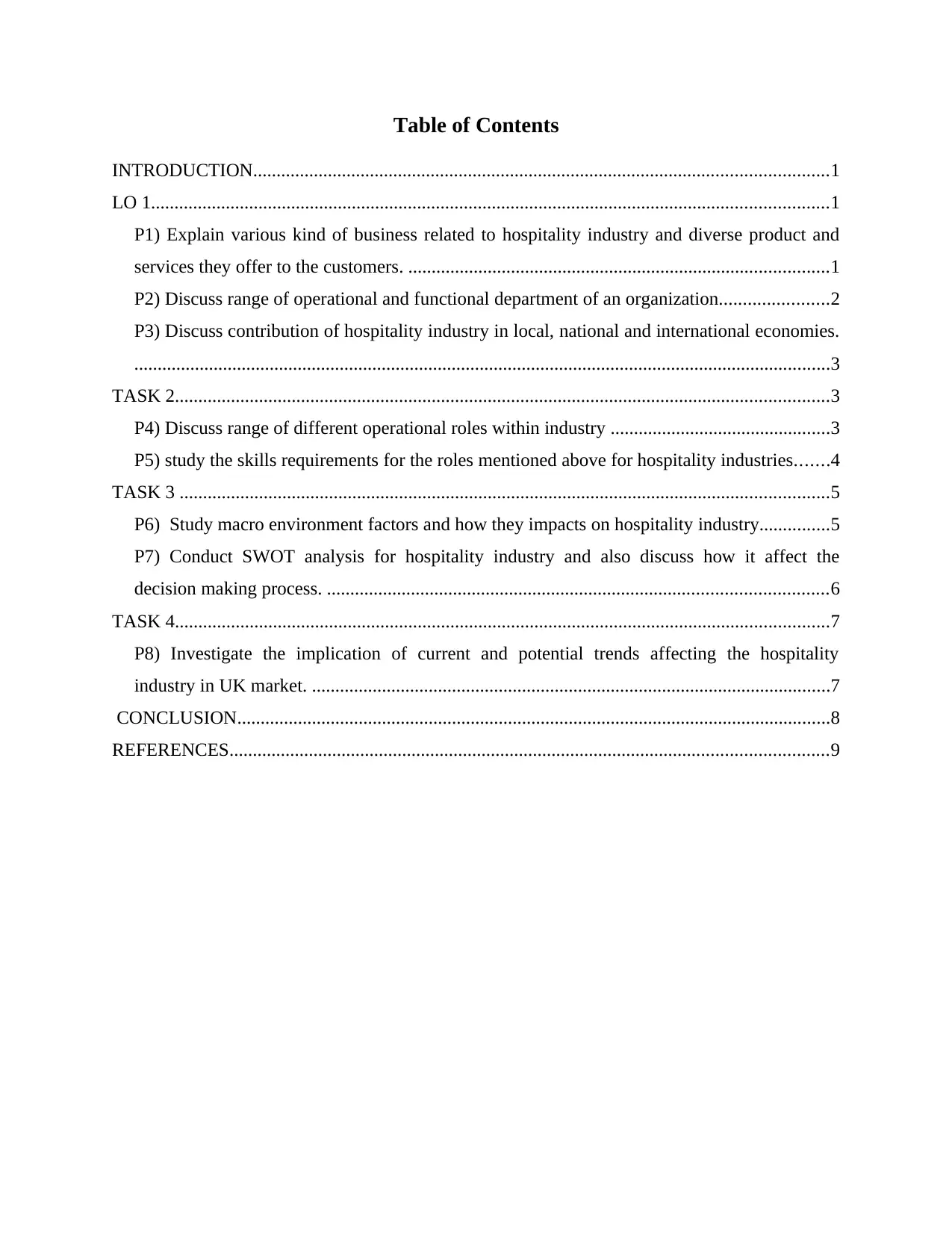
Table of Contents
INTRODUCTION...........................................................................................................................1
LO 1.................................................................................................................................................1
P1) Explain various kind of business related to hospitality industry and diverse product and
services they offer to the customers. ..........................................................................................1
P2) Discuss range of operational and functional department of an organization.......................2
P3) Discuss contribution of hospitality industry in local, national and international economies.
.....................................................................................................................................................3
TASK 2............................................................................................................................................3
P4) Discuss range of different operational roles within industry ...............................................3
P5) study the skills requirements for the roles mentioned above for hospitality industries.......4
TASK 3 ...........................................................................................................................................5
P6) Study macro environment factors and how they impacts on hospitality industry...............5
P7) Conduct SWOT analysis for hospitality industry and also discuss how it affect the
decision making process. ...........................................................................................................6
TASK 4............................................................................................................................................7
P8) Investigate the implication of current and potential trends affecting the hospitality
industry in UK market. ...............................................................................................................7
CONCLUSION...............................................................................................................................8
REFERENCES................................................................................................................................9
INTRODUCTION...........................................................................................................................1
LO 1.................................................................................................................................................1
P1) Explain various kind of business related to hospitality industry and diverse product and
services they offer to the customers. ..........................................................................................1
P2) Discuss range of operational and functional department of an organization.......................2
P3) Discuss contribution of hospitality industry in local, national and international economies.
.....................................................................................................................................................3
TASK 2............................................................................................................................................3
P4) Discuss range of different operational roles within industry ...............................................3
P5) study the skills requirements for the roles mentioned above for hospitality industries.......4
TASK 3 ...........................................................................................................................................5
P6) Study macro environment factors and how they impacts on hospitality industry...............5
P7) Conduct SWOT analysis for hospitality industry and also discuss how it affect the
decision making process. ...........................................................................................................6
TASK 4............................................................................................................................................7
P8) Investigate the implication of current and potential trends affecting the hospitality
industry in UK market. ...............................................................................................................7
CONCLUSION...............................................................................................................................8
REFERENCES................................................................................................................................9
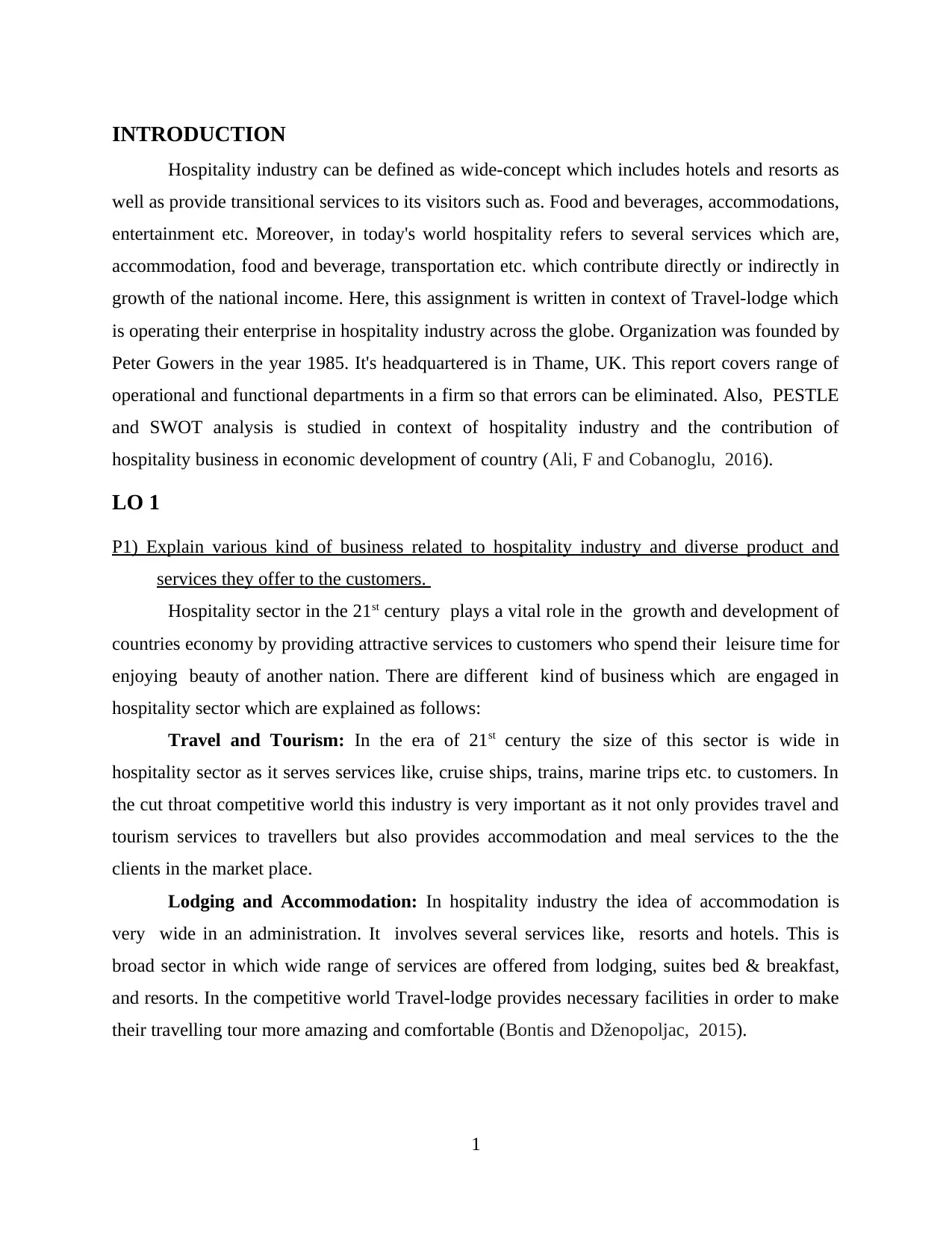
INTRODUCTION
Hospitality industry can be defined as wide-concept which includes hotels and resorts as
well as provide transitional services to its visitors such as. Food and beverages, accommodations,
entertainment etc. Moreover, in today's world hospitality refers to several services which are,
accommodation, food and beverage, transportation etc. which contribute directly or indirectly in
growth of the national income. Here, this assignment is written in context of Travel-lodge which
is operating their enterprise in hospitality industry across the globe. Organization was founded by
Peter Gowers in the year 1985. It's headquartered is in Thame, UK. This report covers range of
operational and functional departments in a firm so that errors can be eliminated. Also, PESTLE
and SWOT analysis is studied in context of hospitality industry and the contribution of
hospitality business in economic development of country (Ali, F and Cobanoglu, 2016).
LO 1
P1) Explain various kind of business related to hospitality industry and diverse product and
services they offer to the customers.
Hospitality sector in the 21st century plays a vital role in the growth and development of
countries economy by providing attractive services to customers who spend their leisure time for
enjoying beauty of another nation. There are different kind of business which are engaged in
hospitality sector which are explained as follows:
Travel and Tourism: In the era of 21st century the size of this sector is wide in
hospitality sector as it serves services like, cruise ships, trains, marine trips etc. to customers. In
the cut throat competitive world this industry is very important as it not only provides travel and
tourism services to travellers but also provides accommodation and meal services to the the
clients in the market place.
Lodging and Accommodation: In hospitality industry the idea of accommodation is
very wide in an administration. It involves several services like, resorts and hotels. This is
broad sector in which wide range of services are offered from lodging, suites bed & breakfast,
and resorts. In the competitive world Travel-lodge provides necessary facilities in order to make
their travelling tour more amazing and comfortable (Bontis and Dženopoljac, 2015).
1
Hospitality industry can be defined as wide-concept which includes hotels and resorts as
well as provide transitional services to its visitors such as. Food and beverages, accommodations,
entertainment etc. Moreover, in today's world hospitality refers to several services which are,
accommodation, food and beverage, transportation etc. which contribute directly or indirectly in
growth of the national income. Here, this assignment is written in context of Travel-lodge which
is operating their enterprise in hospitality industry across the globe. Organization was founded by
Peter Gowers in the year 1985. It's headquartered is in Thame, UK. This report covers range of
operational and functional departments in a firm so that errors can be eliminated. Also, PESTLE
and SWOT analysis is studied in context of hospitality industry and the contribution of
hospitality business in economic development of country (Ali, F and Cobanoglu, 2016).
LO 1
P1) Explain various kind of business related to hospitality industry and diverse product and
services they offer to the customers.
Hospitality sector in the 21st century plays a vital role in the growth and development of
countries economy by providing attractive services to customers who spend their leisure time for
enjoying beauty of another nation. There are different kind of business which are engaged in
hospitality sector which are explained as follows:
Travel and Tourism: In the era of 21st century the size of this sector is wide in
hospitality sector as it serves services like, cruise ships, trains, marine trips etc. to customers. In
the cut throat competitive world this industry is very important as it not only provides travel and
tourism services to travellers but also provides accommodation and meal services to the the
clients in the market place.
Lodging and Accommodation: In hospitality industry the idea of accommodation is
very wide in an administration. It involves several services like, resorts and hotels. This is
broad sector in which wide range of services are offered from lodging, suites bed & breakfast,
and resorts. In the competitive world Travel-lodge provides necessary facilities in order to make
their travelling tour more amazing and comfortable (Bontis and Dženopoljac, 2015).
1
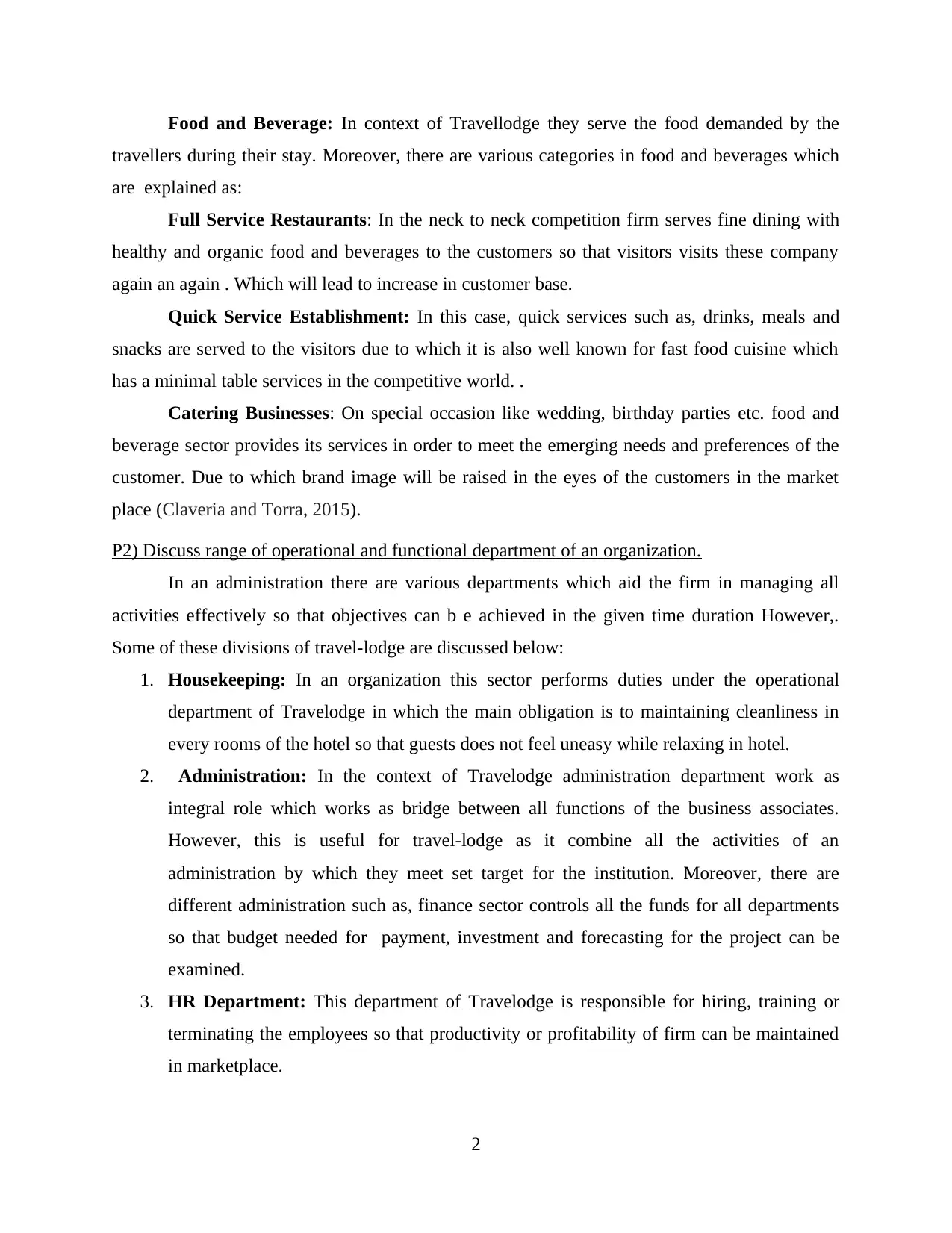
Food and Beverage: In context of Travellodge they serve the food demanded by the
travellers during their stay. Moreover, there are various categories in food and beverages which
are explained as:
Full Service Restaurants: In the neck to neck competition firm serves fine dining with
healthy and organic food and beverages to the customers so that visitors visits these company
again an again . Which will lead to increase in customer base.
Quick Service Establishment: In this case, quick services such as, drinks, meals and
snacks are served to the visitors due to which it is also well known for fast food cuisine which
has a minimal table services in the competitive world. .
Catering Businesses: On special occasion like wedding, birthday parties etc. food and
beverage sector provides its services in order to meet the emerging needs and preferences of the
customer. Due to which brand image will be raised in the eyes of the customers in the market
place (Claveria and Torra, 2015).
P2) Discuss range of operational and functional department of an organization.
In an administration there are various departments which aid the firm in managing all
activities effectively so that objectives can b e achieved in the given time duration However,.
Some of these divisions of travel-lodge are discussed below:
1. Housekeeping: In an organization this sector performs duties under the operational
department of Travelodge in which the main obligation is to maintaining cleanliness in
every rooms of the hotel so that guests does not feel uneasy while relaxing in hotel.
2. Administration: In the context of Travelodge administration department work as
integral role which works as bridge between all functions of the business associates.
However, this is useful for travel-lodge as it combine all the activities of an
administration by which they meet set target for the institution. Moreover, there are
different administration such as, finance sector controls all the funds for all departments
so that budget needed for payment, investment and forecasting for the project can be
examined.
3. HR Department: This department of Travelodge is responsible for hiring, training or
terminating the employees so that productivity or profitability of firm can be maintained
in marketplace.
2
travellers during their stay. Moreover, there are various categories in food and beverages which
are explained as:
Full Service Restaurants: In the neck to neck competition firm serves fine dining with
healthy and organic food and beverages to the customers so that visitors visits these company
again an again . Which will lead to increase in customer base.
Quick Service Establishment: In this case, quick services such as, drinks, meals and
snacks are served to the visitors due to which it is also well known for fast food cuisine which
has a minimal table services in the competitive world. .
Catering Businesses: On special occasion like wedding, birthday parties etc. food and
beverage sector provides its services in order to meet the emerging needs and preferences of the
customer. Due to which brand image will be raised in the eyes of the customers in the market
place (Claveria and Torra, 2015).
P2) Discuss range of operational and functional department of an organization.
In an administration there are various departments which aid the firm in managing all
activities effectively so that objectives can b e achieved in the given time duration However,.
Some of these divisions of travel-lodge are discussed below:
1. Housekeeping: In an organization this sector performs duties under the operational
department of Travelodge in which the main obligation is to maintaining cleanliness in
every rooms of the hotel so that guests does not feel uneasy while relaxing in hotel.
2. Administration: In the context of Travelodge administration department work as
integral role which works as bridge between all functions of the business associates.
However, this is useful for travel-lodge as it combine all the activities of an
administration by which they meet set target for the institution. Moreover, there are
different administration such as, finance sector controls all the funds for all departments
so that budget needed for payment, investment and forecasting for the project can be
examined.
3. HR Department: This department of Travelodge is responsible for hiring, training or
terminating the employees so that productivity or profitability of firm can be maintained
in marketplace.
2
Secure Best Marks with AI Grader
Need help grading? Try our AI Grader for instant feedback on your assignments.
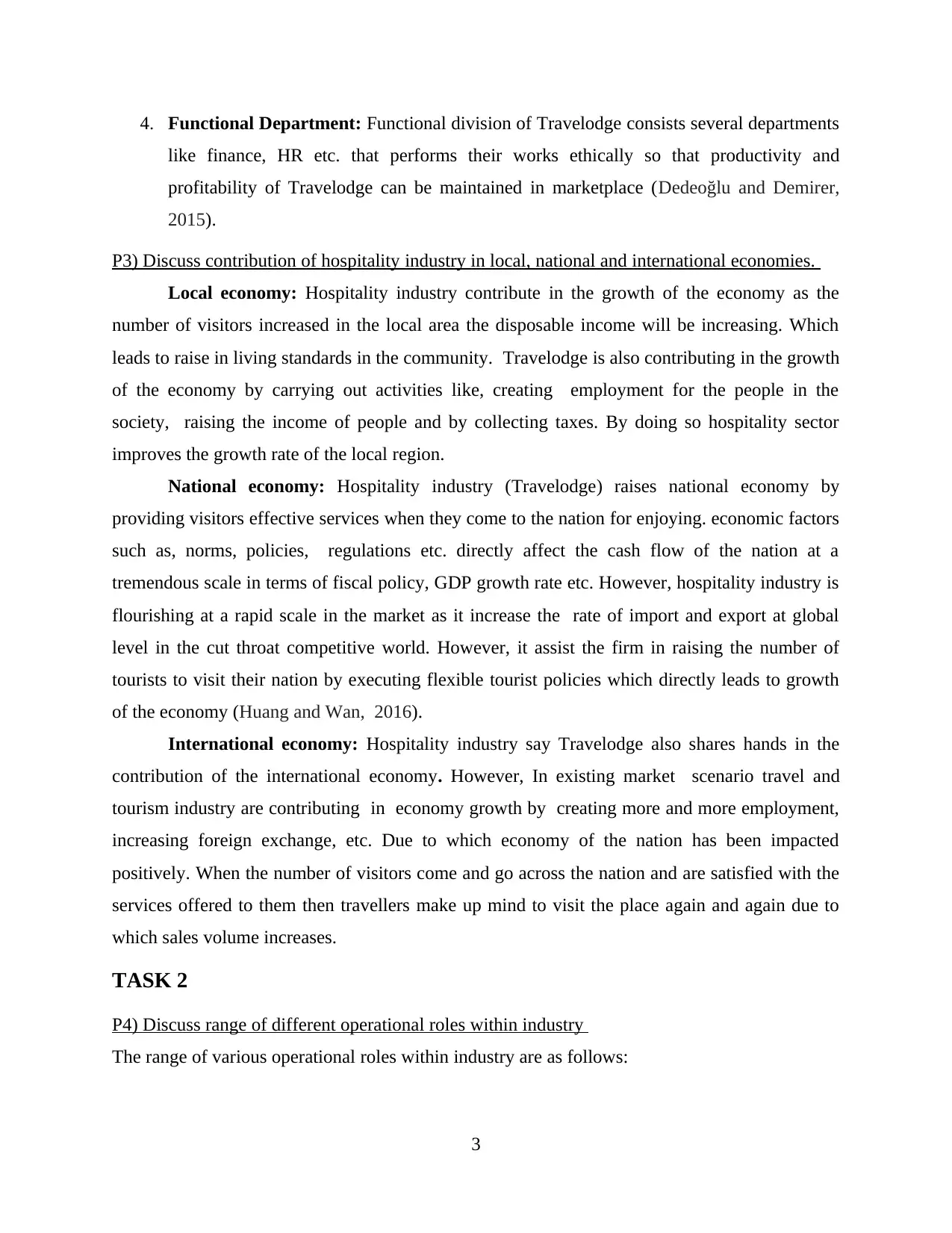
4. Functional Department: Functional division of Travelodge consists several departments
like finance, HR etc. that performs their works ethically so that productivity and
profitability of Travelodge can be maintained in marketplace (Dedeoğlu and Demirer,
2015).
P3) Discuss contribution of hospitality industry in local, national and international economies.
Local economy: Hospitality industry contribute in the growth of the economy as the
number of visitors increased in the local area the disposable income will be increasing. Which
leads to raise in living standards in the community. Travelodge is also contributing in the growth
of the economy by carrying out activities like, creating employment for the people in the
society, raising the income of people and by collecting taxes. By doing so hospitality sector
improves the growth rate of the local region.
National economy: Hospitality industry (Travelodge) raises national economy by
providing visitors effective services when they come to the nation for enjoying. economic factors
such as, norms, policies, regulations etc. directly affect the cash flow of the nation at a
tremendous scale in terms of fiscal policy, GDP growth rate etc. However, hospitality industry is
flourishing at a rapid scale in the market as it increase the rate of import and export at global
level in the cut throat competitive world. However, it assist the firm in raising the number of
tourists to visit their nation by executing flexible tourist policies which directly leads to growth
of the economy (Huang and Wan, 2016).
International economy: Hospitality industry say Travelodge also shares hands in the
contribution of the international economy. However, In existing market scenario travel and
tourism industry are contributing in economy growth by creating more and more employment,
increasing foreign exchange, etc. Due to which economy of the nation has been impacted
positively. When the number of visitors come and go across the nation and are satisfied with the
services offered to them then travellers make up mind to visit the place again and again due to
which sales volume increases.
TASK 2
P4) Discuss range of different operational roles within industry
The range of various operational roles within industry are as follows:
3
like finance, HR etc. that performs their works ethically so that productivity and
profitability of Travelodge can be maintained in marketplace (Dedeoğlu and Demirer,
2015).
P3) Discuss contribution of hospitality industry in local, national and international economies.
Local economy: Hospitality industry contribute in the growth of the economy as the
number of visitors increased in the local area the disposable income will be increasing. Which
leads to raise in living standards in the community. Travelodge is also contributing in the growth
of the economy by carrying out activities like, creating employment for the people in the
society, raising the income of people and by collecting taxes. By doing so hospitality sector
improves the growth rate of the local region.
National economy: Hospitality industry (Travelodge) raises national economy by
providing visitors effective services when they come to the nation for enjoying. economic factors
such as, norms, policies, regulations etc. directly affect the cash flow of the nation at a
tremendous scale in terms of fiscal policy, GDP growth rate etc. However, hospitality industry is
flourishing at a rapid scale in the market as it increase the rate of import and export at global
level in the cut throat competitive world. However, it assist the firm in raising the number of
tourists to visit their nation by executing flexible tourist policies which directly leads to growth
of the economy (Huang and Wan, 2016).
International economy: Hospitality industry say Travelodge also shares hands in the
contribution of the international economy. However, In existing market scenario travel and
tourism industry are contributing in economy growth by creating more and more employment,
increasing foreign exchange, etc. Due to which economy of the nation has been impacted
positively. When the number of visitors come and go across the nation and are satisfied with the
services offered to them then travellers make up mind to visit the place again and again due to
which sales volume increases.
TASK 2
P4) Discuss range of different operational roles within industry
The range of various operational roles within industry are as follows:
3
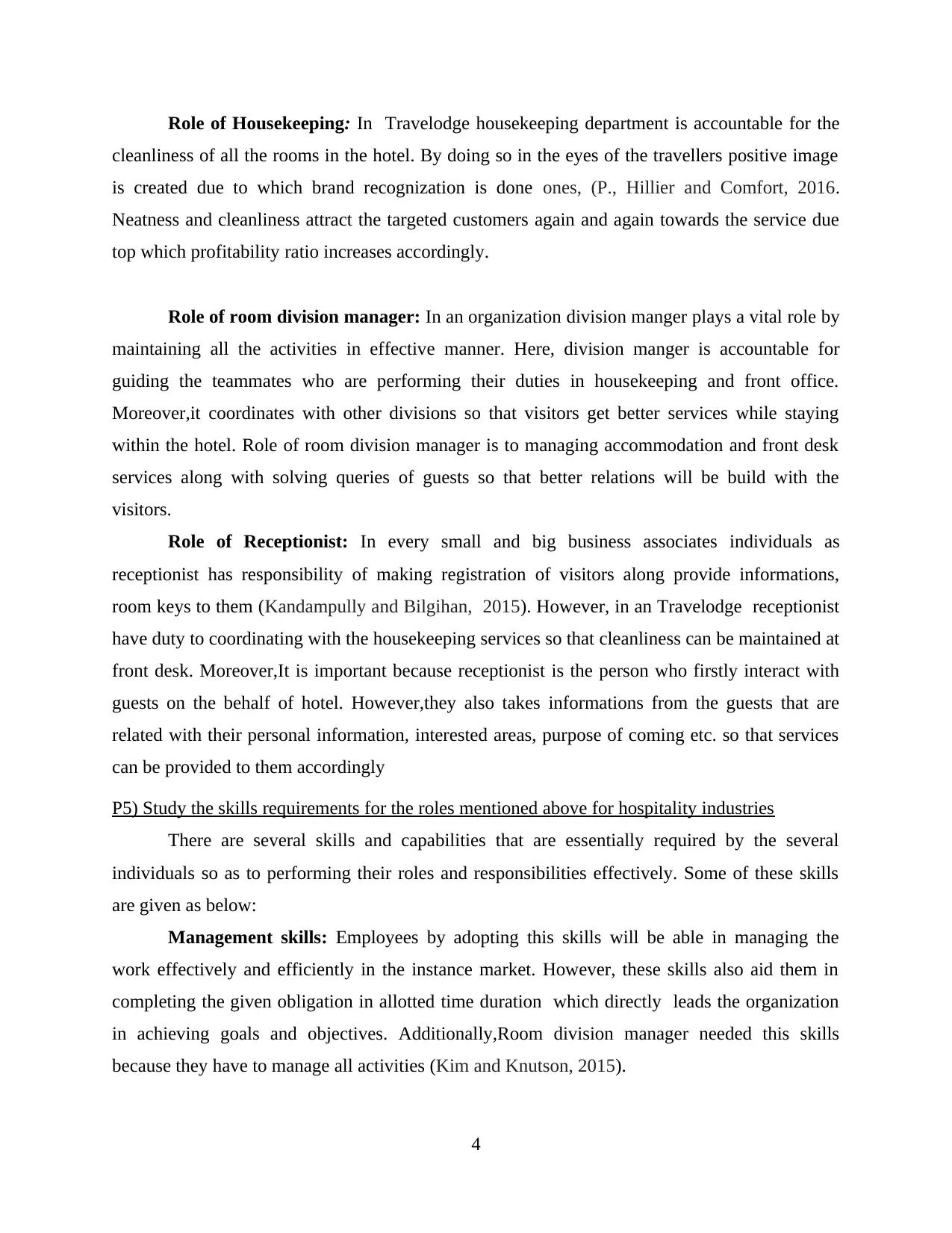
Role of Housekeeping: In Travelodge housekeeping department is accountable for the
cleanliness of all the rooms in the hotel. By doing so in the eyes of the travellers positive image
is created due to which brand recognization is done ones, (P., Hillier and Comfort, 2016.
Neatness and cleanliness attract the targeted customers again and again towards the service due
top which profitability ratio increases accordingly.
Role of room division manager: In an organization division manger plays a vital role by
maintaining all the activities in effective manner. Here, division manger is accountable for
guiding the teammates who are performing their duties in housekeeping and front office.
Moreover,it coordinates with other divisions so that visitors get better services while staying
within the hotel. Role of room division manager is to managing accommodation and front desk
services along with solving queries of guests so that better relations will be build with the
visitors.
Role of Receptionist: In every small and big business associates individuals as
receptionist has responsibility of making registration of visitors along provide informations,
room keys to them (Kandampully and Bilgihan, 2015). However, in an Travelodge receptionist
have duty to coordinating with the housekeeping services so that cleanliness can be maintained at
front desk. Moreover,It is important because receptionist is the person who firstly interact with
guests on the behalf of hotel. However,they also takes informations from the guests that are
related with their personal information, interested areas, purpose of coming etc. so that services
can be provided to them accordingly
P5) Study the skills requirements for the roles mentioned above for hospitality industries
There are several skills and capabilities that are essentially required by the several
individuals so as to performing their roles and responsibilities effectively. Some of these skills
are given as below:
Management skills: Employees by adopting this skills will be able in managing the
work effectively and efficiently in the instance market. However, these skills also aid them in
completing the given obligation in allotted time duration which directly leads the organization
in achieving goals and objectives. Additionally,Room division manager needed this skills
because they have to manage all activities (Kim and Knutson, 2015).
4
cleanliness of all the rooms in the hotel. By doing so in the eyes of the travellers positive image
is created due to which brand recognization is done ones, (P., Hillier and Comfort, 2016.
Neatness and cleanliness attract the targeted customers again and again towards the service due
top which profitability ratio increases accordingly.
Role of room division manager: In an organization division manger plays a vital role by
maintaining all the activities in effective manner. Here, division manger is accountable for
guiding the teammates who are performing their duties in housekeeping and front office.
Moreover,it coordinates with other divisions so that visitors get better services while staying
within the hotel. Role of room division manager is to managing accommodation and front desk
services along with solving queries of guests so that better relations will be build with the
visitors.
Role of Receptionist: In every small and big business associates individuals as
receptionist has responsibility of making registration of visitors along provide informations,
room keys to them (Kandampully and Bilgihan, 2015). However, in an Travelodge receptionist
have duty to coordinating with the housekeeping services so that cleanliness can be maintained at
front desk. Moreover,It is important because receptionist is the person who firstly interact with
guests on the behalf of hotel. However,they also takes informations from the guests that are
related with their personal information, interested areas, purpose of coming etc. so that services
can be provided to them accordingly
P5) Study the skills requirements for the roles mentioned above for hospitality industries
There are several skills and capabilities that are essentially required by the several
individuals so as to performing their roles and responsibilities effectively. Some of these skills
are given as below:
Management skills: Employees by adopting this skills will be able in managing the
work effectively and efficiently in the instance market. However, these skills also aid them in
completing the given obligation in allotted time duration which directly leads the organization
in achieving goals and objectives. Additionally,Room division manager needed this skills
because they have to manage all activities (Kim and Knutson, 2015).
4
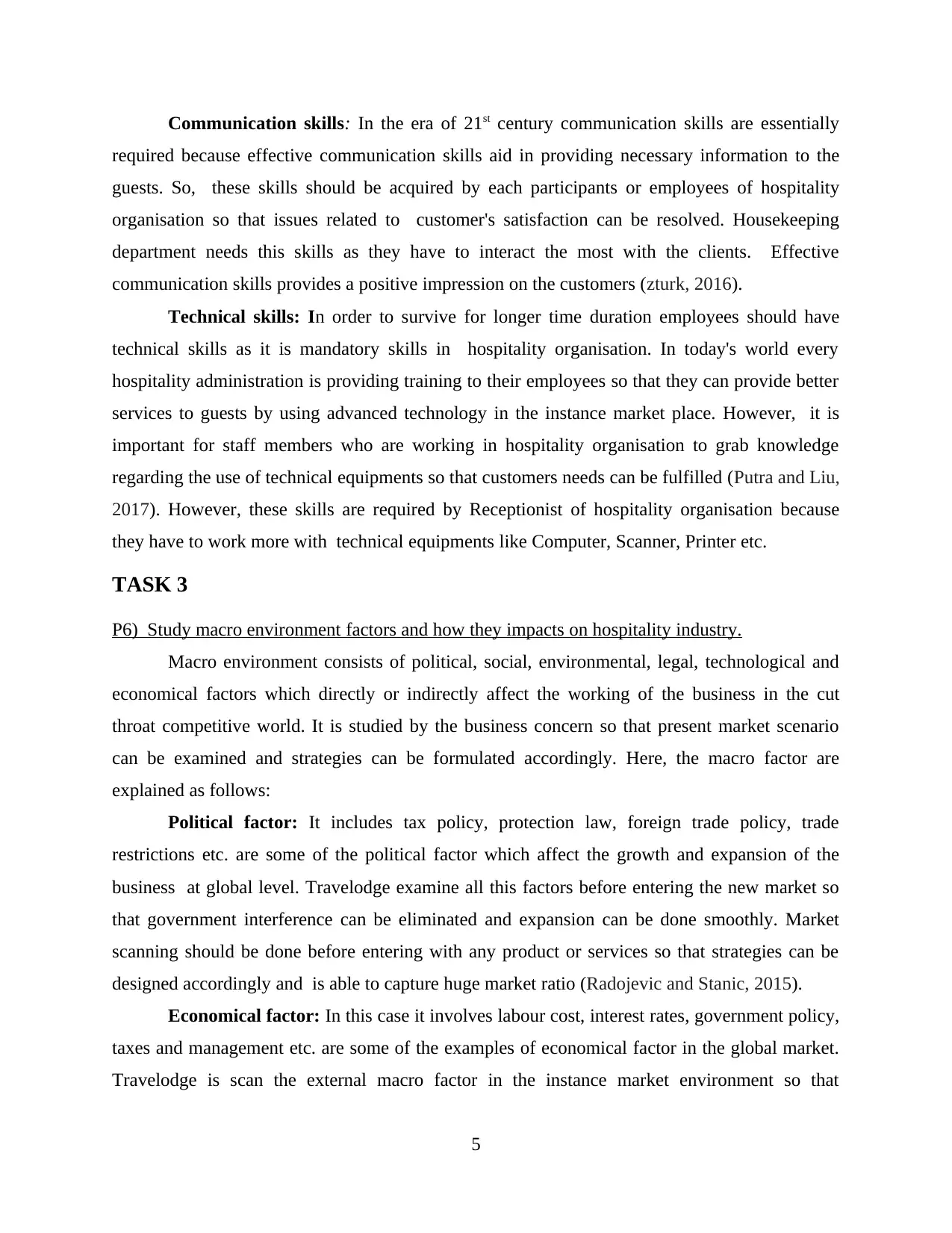
Communication skills: In the era of 21st century communication skills are essentially
required because effective communication skills aid in providing necessary information to the
guests. So, these skills should be acquired by each participants or employees of hospitality
organisation so that issues related to customer's satisfaction can be resolved. Housekeeping
department needs this skills as they have to interact the most with the clients. Effective
communication skills provides a positive impression on the customers (zturk, 2016).
Technical skills: In order to survive for longer time duration employees should have
technical skills as it is mandatory skills in hospitality organisation. In today's world every
hospitality administration is providing training to their employees so that they can provide better
services to guests by using advanced technology in the instance market place. However, it is
important for staff members who are working in hospitality organisation to grab knowledge
regarding the use of technical equipments so that customers needs can be fulfilled (Putra and Liu,
2017). However, these skills are required by Receptionist of hospitality organisation because
they have to work more with technical equipments like Computer, Scanner, Printer etc.
TASK 3
P6) Study macro environment factors and how they impacts on hospitality industry.
Macro environment consists of political, social, environmental, legal, technological and
economical factors which directly or indirectly affect the working of the business in the cut
throat competitive world. It is studied by the business concern so that present market scenario
can be examined and strategies can be formulated accordingly. Here, the macro factor are
explained as follows:
Political factor: It includes tax policy, protection law, foreign trade policy, trade
restrictions etc. are some of the political factor which affect the growth and expansion of the
business at global level. Travelodge examine all this factors before entering the new market so
that government interference can be eliminated and expansion can be done smoothly. Market
scanning should be done before entering with any product or services so that strategies can be
designed accordingly and is able to capture huge market ratio (Radojevic and Stanic, 2015).
Economical factor: In this case it involves labour cost, interest rates, government policy,
taxes and management etc. are some of the examples of economical factor in the global market.
Travelodge is scan the external macro factor in the instance market environment so that
5
required because effective communication skills aid in providing necessary information to the
guests. So, these skills should be acquired by each participants or employees of hospitality
organisation so that issues related to customer's satisfaction can be resolved. Housekeeping
department needs this skills as they have to interact the most with the clients. Effective
communication skills provides a positive impression on the customers (zturk, 2016).
Technical skills: In order to survive for longer time duration employees should have
technical skills as it is mandatory skills in hospitality organisation. In today's world every
hospitality administration is providing training to their employees so that they can provide better
services to guests by using advanced technology in the instance market place. However, it is
important for staff members who are working in hospitality organisation to grab knowledge
regarding the use of technical equipments so that customers needs can be fulfilled (Putra and Liu,
2017). However, these skills are required by Receptionist of hospitality organisation because
they have to work more with technical equipments like Computer, Scanner, Printer etc.
TASK 3
P6) Study macro environment factors and how they impacts on hospitality industry.
Macro environment consists of political, social, environmental, legal, technological and
economical factors which directly or indirectly affect the working of the business in the cut
throat competitive world. It is studied by the business concern so that present market scenario
can be examined and strategies can be formulated accordingly. Here, the macro factor are
explained as follows:
Political factor: It includes tax policy, protection law, foreign trade policy, trade
restrictions etc. are some of the political factor which affect the growth and expansion of the
business at global level. Travelodge examine all this factors before entering the new market so
that government interference can be eliminated and expansion can be done smoothly. Market
scanning should be done before entering with any product or services so that strategies can be
designed accordingly and is able to capture huge market ratio (Radojevic and Stanic, 2015).
Economical factor: In this case it involves labour cost, interest rates, government policy,
taxes and management etc. are some of the examples of economical factor in the global market.
Travelodge is scan the external macro factor in the instance market environment so that
5
Paraphrase This Document
Need a fresh take? Get an instant paraphrase of this document with our AI Paraphraser
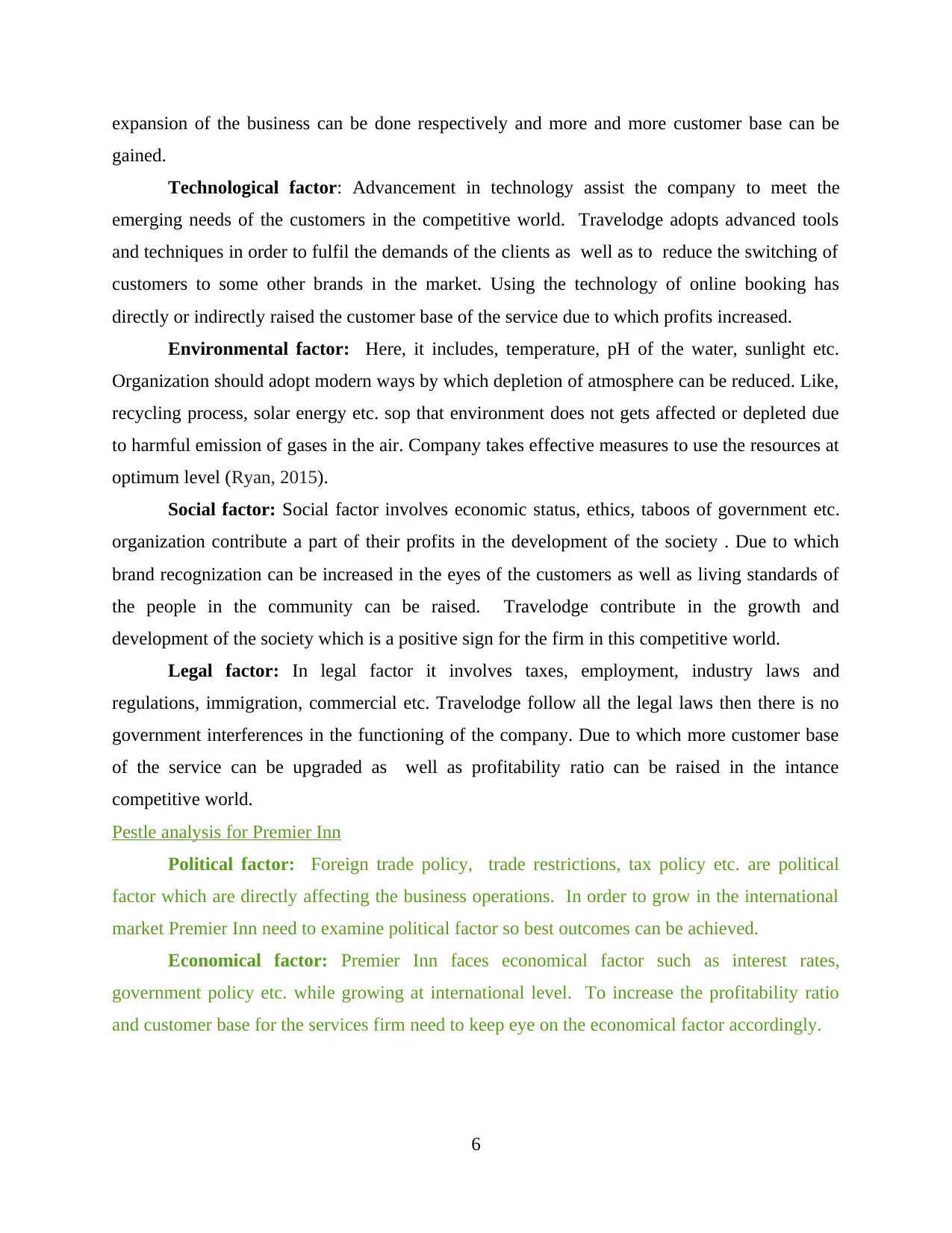
expansion of the business can be done respectively and more and more customer base can be
gained.
Technological factor: Advancement in technology assist the company to meet the
emerging needs of the customers in the competitive world. Travelodge adopts advanced tools
and techniques in order to fulfil the demands of the clients as well as to reduce the switching of
customers to some other brands in the market. Using the technology of online booking has
directly or indirectly raised the customer base of the service due to which profits increased.
Environmental factor: Here, it includes, temperature, pH of the water, sunlight etc.
Organization should adopt modern ways by which depletion of atmosphere can be reduced. Like,
recycling process, solar energy etc. sop that environment does not gets affected or depleted due
to harmful emission of gases in the air. Company takes effective measures to use the resources at
optimum level (Ryan, 2015).
Social factor: Social factor involves economic status, ethics, taboos of government etc.
organization contribute a part of their profits in the development of the society . Due to which
brand recognization can be increased in the eyes of the customers as well as living standards of
the people in the community can be raised. Travelodge contribute in the growth and
development of the society which is a positive sign for the firm in this competitive world.
Legal factor: In legal factor it involves taxes, employment, industry laws and
regulations, immigration, commercial etc. Travelodge follow all the legal laws then there is no
government interferences in the functioning of the company. Due to which more customer base
of the service can be upgraded as well as profitability ratio can be raised in the intance
competitive world.
Pestle analysis for Premier Inn
Political factor: Foreign trade policy, trade restrictions, tax policy etc. are political
factor which are directly affecting the business operations. In order to grow in the international
market Premier Inn need to examine political factor so best outcomes can be achieved.
Economical factor: Premier Inn faces economical factor such as interest rates,
government policy etc. while growing at international level. To increase the profitability ratio
and customer base for the services firm need to keep eye on the economical factor accordingly.
6
gained.
Technological factor: Advancement in technology assist the company to meet the
emerging needs of the customers in the competitive world. Travelodge adopts advanced tools
and techniques in order to fulfil the demands of the clients as well as to reduce the switching of
customers to some other brands in the market. Using the technology of online booking has
directly or indirectly raised the customer base of the service due to which profits increased.
Environmental factor: Here, it includes, temperature, pH of the water, sunlight etc.
Organization should adopt modern ways by which depletion of atmosphere can be reduced. Like,
recycling process, solar energy etc. sop that environment does not gets affected or depleted due
to harmful emission of gases in the air. Company takes effective measures to use the resources at
optimum level (Ryan, 2015).
Social factor: Social factor involves economic status, ethics, taboos of government etc.
organization contribute a part of their profits in the development of the society . Due to which
brand recognization can be increased in the eyes of the customers as well as living standards of
the people in the community can be raised. Travelodge contribute in the growth and
development of the society which is a positive sign for the firm in this competitive world.
Legal factor: In legal factor it involves taxes, employment, industry laws and
regulations, immigration, commercial etc. Travelodge follow all the legal laws then there is no
government interferences in the functioning of the company. Due to which more customer base
of the service can be upgraded as well as profitability ratio can be raised in the intance
competitive world.
Pestle analysis for Premier Inn
Political factor: Foreign trade policy, trade restrictions, tax policy etc. are political
factor which are directly affecting the business operations. In order to grow in the international
market Premier Inn need to examine political factor so best outcomes can be achieved.
Economical factor: Premier Inn faces economical factor such as interest rates,
government policy etc. while growing at international level. To increase the profitability ratio
and customer base for the services firm need to keep eye on the economical factor accordingly.
6
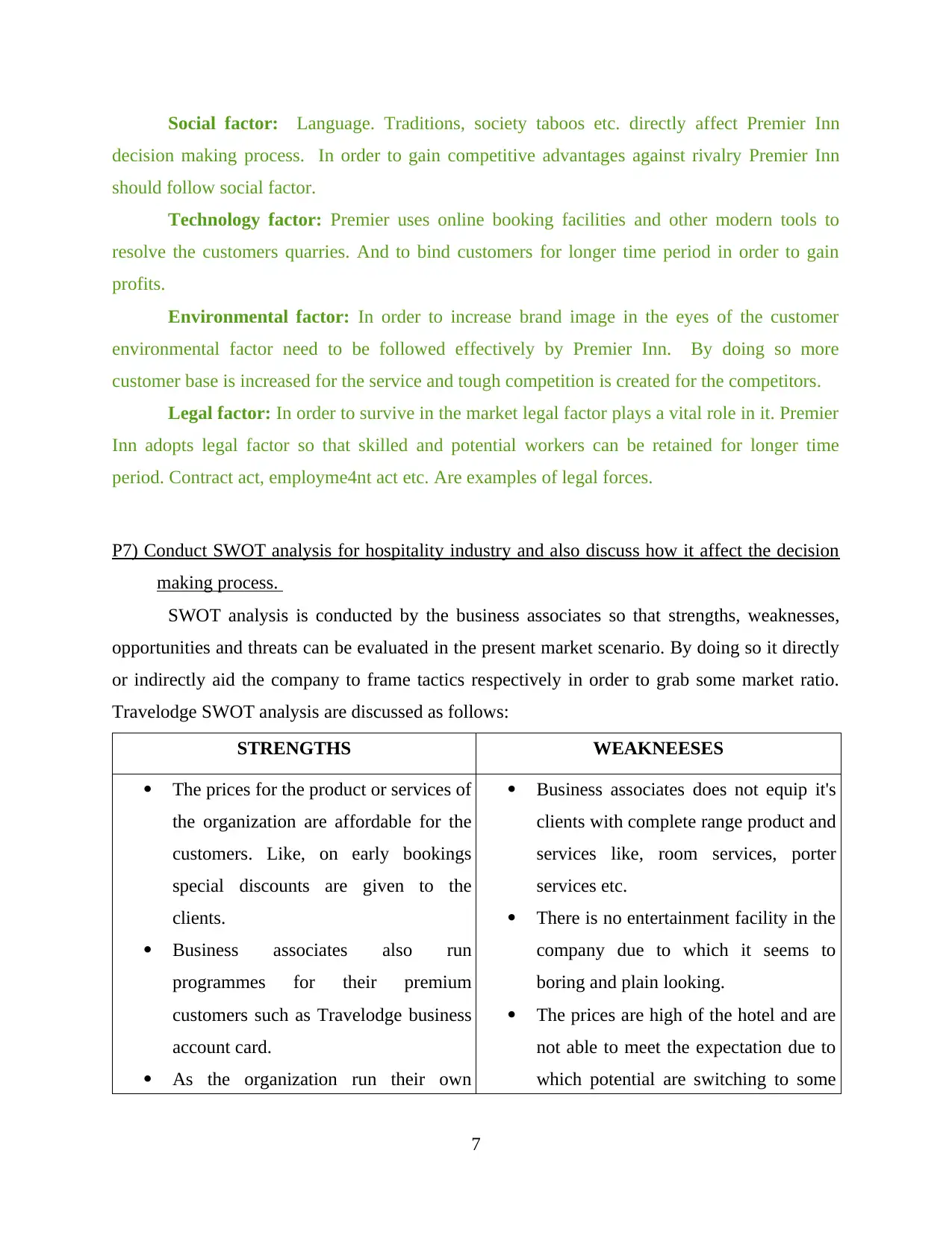
Social factor: Language. Traditions, society taboos etc. directly affect Premier Inn
decision making process. In order to gain competitive advantages against rivalry Premier Inn
should follow social factor.
Technology factor: Premier uses online booking facilities and other modern tools to
resolve the customers quarries. And to bind customers for longer time period in order to gain
profits.
Environmental factor: In order to increase brand image in the eyes of the customer
environmental factor need to be followed effectively by Premier Inn. By doing so more
customer base is increased for the service and tough competition is created for the competitors.
Legal factor: In order to survive in the market legal factor plays a vital role in it. Premier
Inn adopts legal factor so that skilled and potential workers can be retained for longer time
period. Contract act, employme4nt act etc. Are examples of legal forces.
P7) Conduct SWOT analysis for hospitality industry and also discuss how it affect the decision
making process.
SWOT analysis is conducted by the business associates so that strengths, weaknesses,
opportunities and threats can be evaluated in the present market scenario. By doing so it directly
or indirectly aid the company to frame tactics respectively in order to grab some market ratio.
Travelodge SWOT analysis are discussed as follows:
STRENGTHS WEAKNEESES
The prices for the product or services of
the organization are affordable for the
customers. Like, on early bookings
special discounts are given to the
clients.
Business associates also run
programmes for their premium
customers such as Travelodge business
account card.
As the organization run their own
Business associates does not equip it's
clients with complete range product and
services like, room services, porter
services etc.
There is no entertainment facility in the
company due to which it seems to
boring and plain looking.
The prices are high of the hotel and are
not able to meet the expectation due to
which potential are switching to some
7
decision making process. In order to gain competitive advantages against rivalry Premier Inn
should follow social factor.
Technology factor: Premier uses online booking facilities and other modern tools to
resolve the customers quarries. And to bind customers for longer time period in order to gain
profits.
Environmental factor: In order to increase brand image in the eyes of the customer
environmental factor need to be followed effectively by Premier Inn. By doing so more
customer base is increased for the service and tough competition is created for the competitors.
Legal factor: In order to survive in the market legal factor plays a vital role in it. Premier
Inn adopts legal factor so that skilled and potential workers can be retained for longer time
period. Contract act, employme4nt act etc. Are examples of legal forces.
P7) Conduct SWOT analysis for hospitality industry and also discuss how it affect the decision
making process.
SWOT analysis is conducted by the business associates so that strengths, weaknesses,
opportunities and threats can be evaluated in the present market scenario. By doing so it directly
or indirectly aid the company to frame tactics respectively in order to grab some market ratio.
Travelodge SWOT analysis are discussed as follows:
STRENGTHS WEAKNEESES
The prices for the product or services of
the organization are affordable for the
customers. Like, on early bookings
special discounts are given to the
clients.
Business associates also run
programmes for their premium
customers such as Travelodge business
account card.
As the organization run their own
Business associates does not equip it's
clients with complete range product and
services like, room services, porter
services etc.
There is no entertainment facility in the
company due to which it seems to
boring and plain looking.
The prices are high of the hotel and are
not able to meet the expectation due to
which potential are switching to some
7
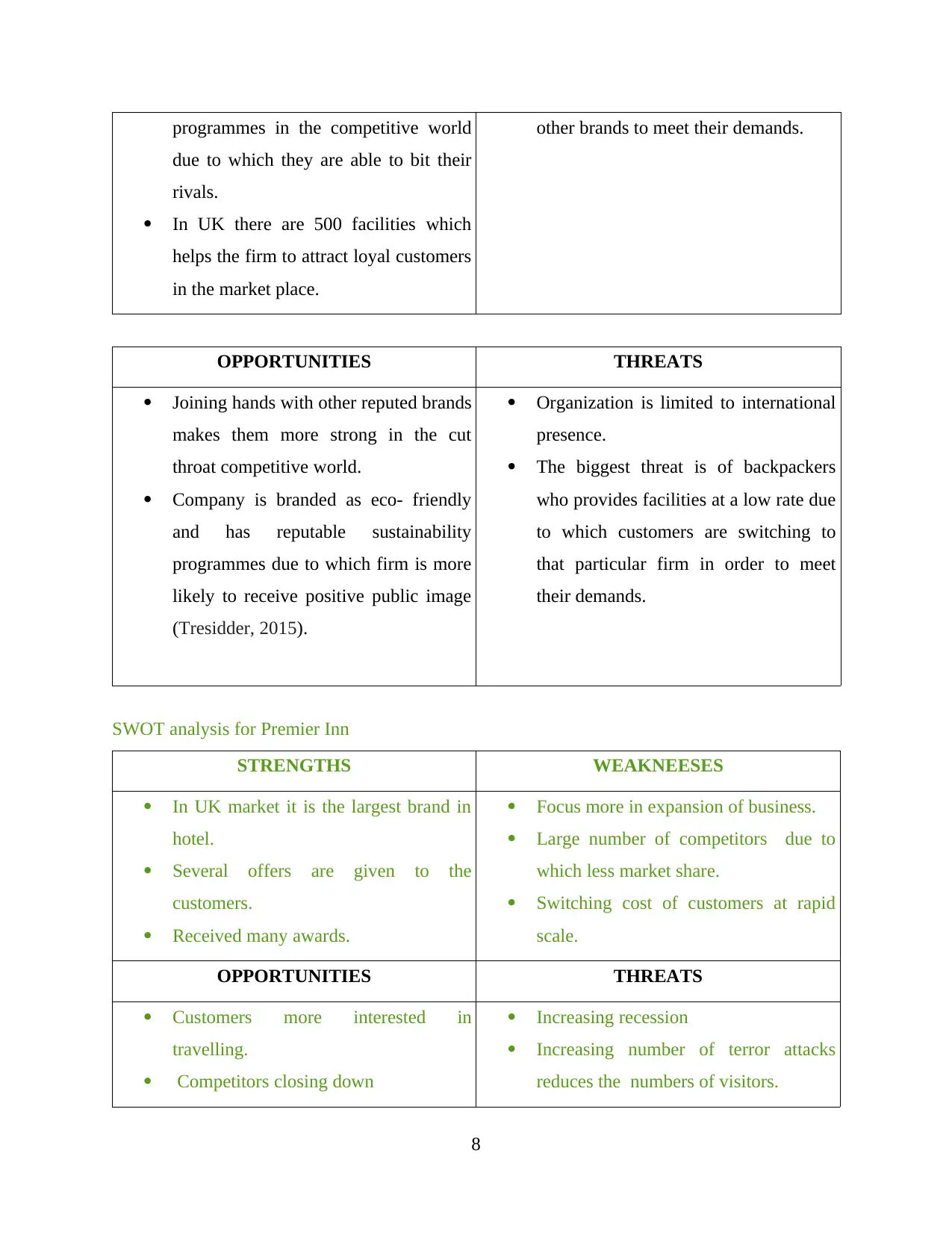
programmes in the competitive world
due to which they are able to bit their
rivals.
In UK there are 500 facilities which
helps the firm to attract loyal customers
in the market place.
other brands to meet their demands.
OPPORTUNITIES THREATS
Joining hands with other reputed brands
makes them more strong in the cut
throat competitive world.
Company is branded as eco- friendly
and has reputable sustainability
programmes due to which firm is more
likely to receive positive public image
(Tresidder, 2015).
Organization is limited to international
presence.
The biggest threat is of backpackers
who provides facilities at a low rate due
to which customers are switching to
that particular firm in order to meet
their demands.
SWOT analysis for Premier Inn
STRENGTHS WEAKNEESES
In UK market it is the largest brand in
hotel.
Several offers are given to the
customers.
Received many awards.
Focus more in expansion of business.
Large number of competitors due to
which less market share.
Switching cost of customers at rapid
scale.
OPPORTUNITIES THREATS
Customers more interested in
travelling.
Competitors closing down
Increasing recession
Increasing number of terror attacks
reduces the numbers of visitors.
8
due to which they are able to bit their
rivals.
In UK there are 500 facilities which
helps the firm to attract loyal customers
in the market place.
other brands to meet their demands.
OPPORTUNITIES THREATS
Joining hands with other reputed brands
makes them more strong in the cut
throat competitive world.
Company is branded as eco- friendly
and has reputable sustainability
programmes due to which firm is more
likely to receive positive public image
(Tresidder, 2015).
Organization is limited to international
presence.
The biggest threat is of backpackers
who provides facilities at a low rate due
to which customers are switching to
that particular firm in order to meet
their demands.
SWOT analysis for Premier Inn
STRENGTHS WEAKNEESES
In UK market it is the largest brand in
hotel.
Several offers are given to the
customers.
Received many awards.
Focus more in expansion of business.
Large number of competitors due to
which less market share.
Switching cost of customers at rapid
scale.
OPPORTUNITIES THREATS
Customers more interested in
travelling.
Competitors closing down
Increasing recession
Increasing number of terror attacks
reduces the numbers of visitors.
8
Secure Best Marks with AI Grader
Need help grading? Try our AI Grader for instant feedback on your assignments.
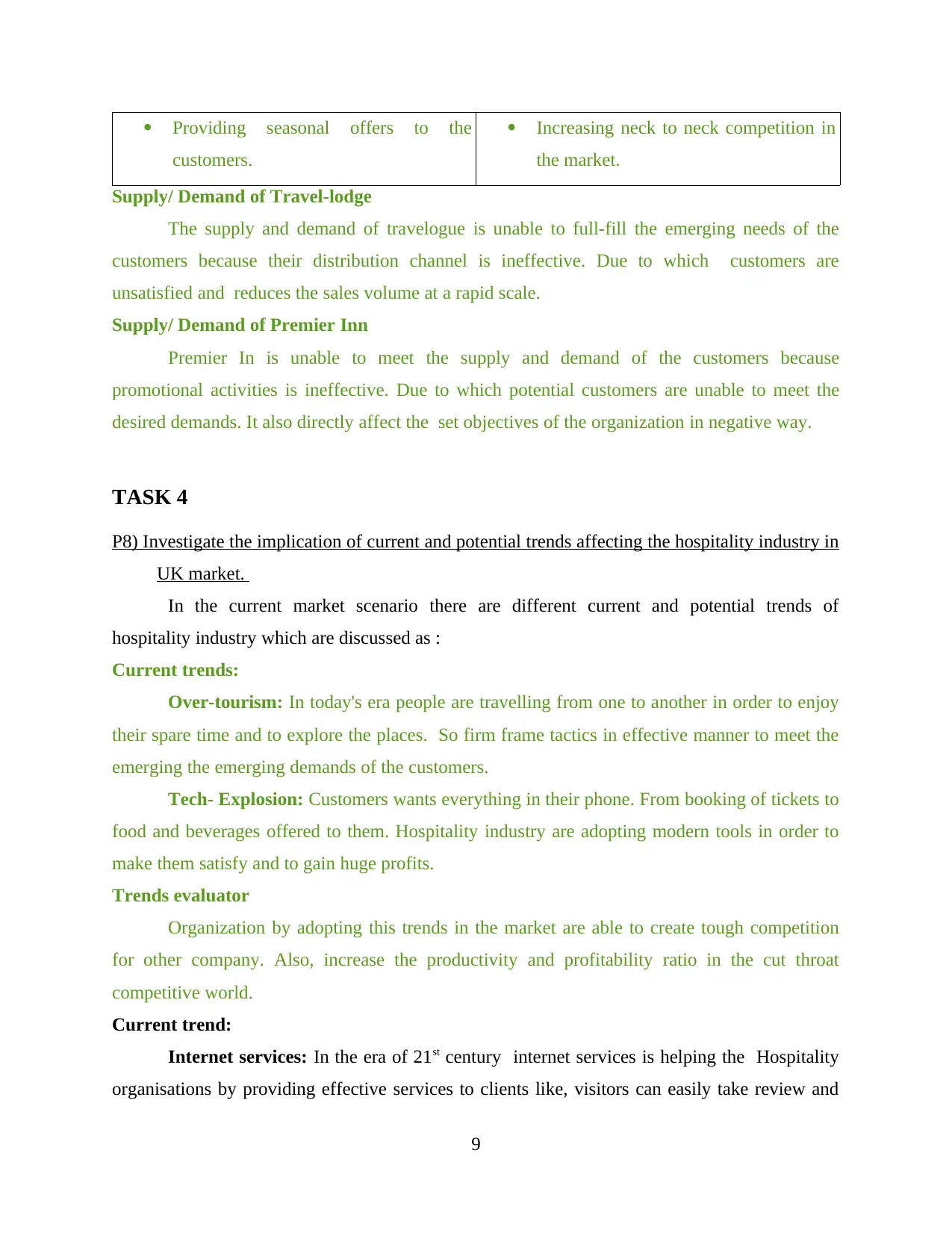
Providing seasonal offers to the
customers.
Increasing neck to neck competition in
the market.
Supply/ Demand of Travel-lodge
The supply and demand of travelogue is unable to full-fill the emerging needs of the
customers because their distribution channel is ineffective. Due to which customers are
unsatisfied and reduces the sales volume at a rapid scale.
Supply/ Demand of Premier Inn
Premier In is unable to meet the supply and demand of the customers because
promotional activities is ineffective. Due to which potential customers are unable to meet the
desired demands. It also directly affect the set objectives of the organization in negative way.
TASK 4
P8) Investigate the implication of current and potential trends affecting the hospitality industry in
UK market.
In the current market scenario there are different current and potential trends of
hospitality industry which are discussed as :
Current trends:
Over-tourism: In today's era people are travelling from one to another in order to enjoy
their spare time and to explore the places. So firm frame tactics in effective manner to meet the
emerging the emerging demands of the customers.
Tech- Explosion: Customers wants everything in their phone. From booking of tickets to
food and beverages offered to them. Hospitality industry are adopting modern tools in order to
make them satisfy and to gain huge profits.
Trends evaluator
Organization by adopting this trends in the market are able to create tough competition
for other company. Also, increase the productivity and profitability ratio in the cut throat
competitive world.
Current trend:
Internet services: In the era of 21st century internet services is helping the Hospitality
organisations by providing effective services to clients like, visitors can easily take review and
9
customers.
Increasing neck to neck competition in
the market.
Supply/ Demand of Travel-lodge
The supply and demand of travelogue is unable to full-fill the emerging needs of the
customers because their distribution channel is ineffective. Due to which customers are
unsatisfied and reduces the sales volume at a rapid scale.
Supply/ Demand of Premier Inn
Premier In is unable to meet the supply and demand of the customers because
promotional activities is ineffective. Due to which potential customers are unable to meet the
desired demands. It also directly affect the set objectives of the organization in negative way.
TASK 4
P8) Investigate the implication of current and potential trends affecting the hospitality industry in
UK market.
In the current market scenario there are different current and potential trends of
hospitality industry which are discussed as :
Current trends:
Over-tourism: In today's era people are travelling from one to another in order to enjoy
their spare time and to explore the places. So firm frame tactics in effective manner to meet the
emerging the emerging demands of the customers.
Tech- Explosion: Customers wants everything in their phone. From booking of tickets to
food and beverages offered to them. Hospitality industry are adopting modern tools in order to
make them satisfy and to gain huge profits.
Trends evaluator
Organization by adopting this trends in the market are able to create tough competition
for other company. Also, increase the productivity and profitability ratio in the cut throat
competitive world.
Current trend:
Internet services: In the era of 21st century internet services is helping the Hospitality
organisations by providing effective services to clients like, visitors can easily take review and
9
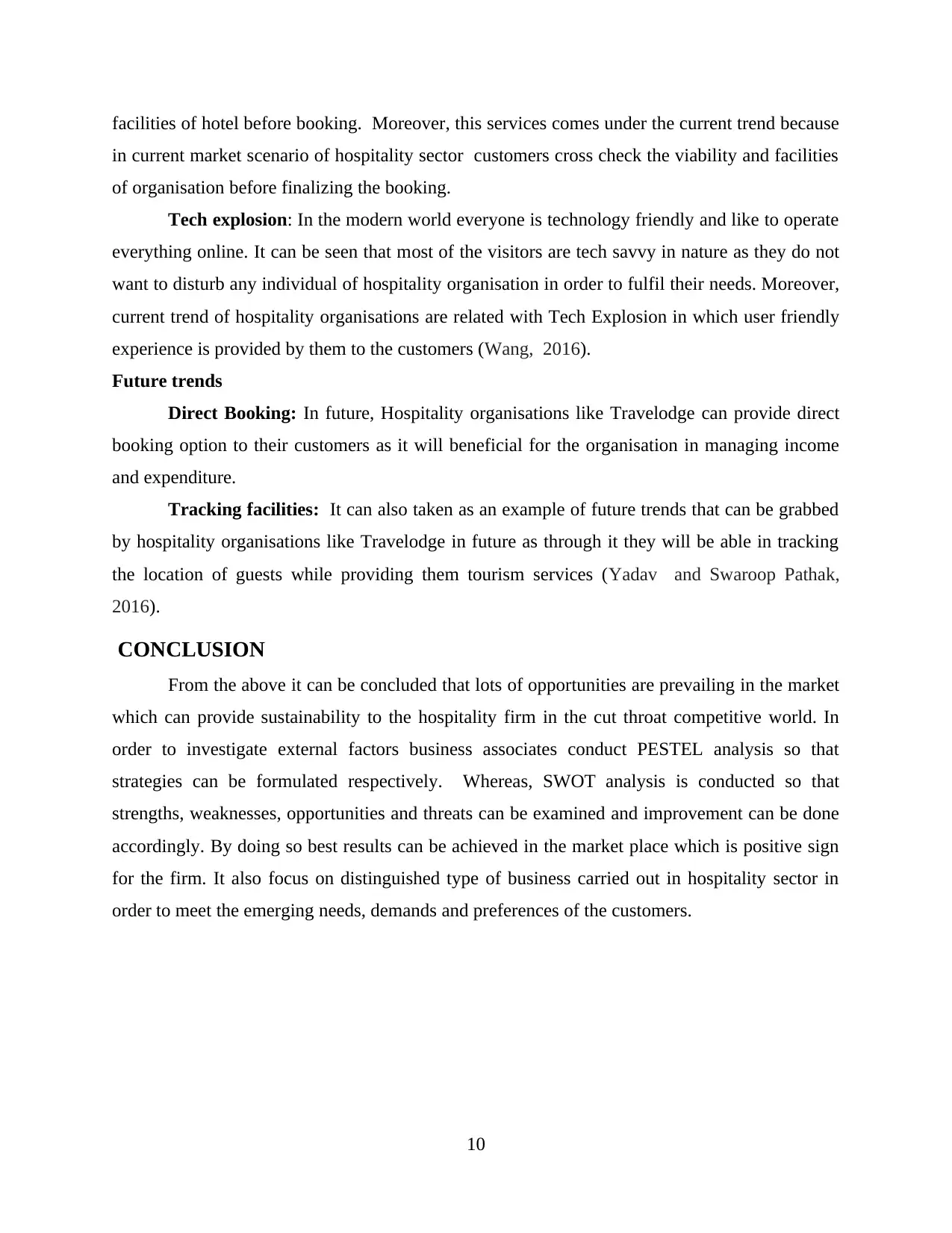
facilities of hotel before booking. Moreover, this services comes under the current trend because
in current market scenario of hospitality sector customers cross check the viability and facilities
of organisation before finalizing the booking.
Tech explosion: In the modern world everyone is technology friendly and like to operate
everything online. It can be seen that most of the visitors are tech savvy in nature as they do not
want to disturb any individual of hospitality organisation in order to fulfil their needs. Moreover,
current trend of hospitality organisations are related with Tech Explosion in which user friendly
experience is provided by them to the customers (Wang, 2016).
Future trends
Direct Booking: In future, Hospitality organisations like Travelodge can provide direct
booking option to their customers as it will beneficial for the organisation in managing income
and expenditure.
Tracking facilities: It can also taken as an example of future trends that can be grabbed
by hospitality organisations like Travelodge in future as through it they will be able in tracking
the location of guests while providing them tourism services (Yadav and Swaroop Pathak,
2016).
CONCLUSION
From the above it can be concluded that lots of opportunities are prevailing in the market
which can provide sustainability to the hospitality firm in the cut throat competitive world. In
order to investigate external factors business associates conduct PESTEL analysis so that
strategies can be formulated respectively. Whereas, SWOT analysis is conducted so that
strengths, weaknesses, opportunities and threats can be examined and improvement can be done
accordingly. By doing so best results can be achieved in the market place which is positive sign
for the firm. It also focus on distinguished type of business carried out in hospitality sector in
order to meet the emerging needs, demands and preferences of the customers.
10
in current market scenario of hospitality sector customers cross check the viability and facilities
of organisation before finalizing the booking.
Tech explosion: In the modern world everyone is technology friendly and like to operate
everything online. It can be seen that most of the visitors are tech savvy in nature as they do not
want to disturb any individual of hospitality organisation in order to fulfil their needs. Moreover,
current trend of hospitality organisations are related with Tech Explosion in which user friendly
experience is provided by them to the customers (Wang, 2016).
Future trends
Direct Booking: In future, Hospitality organisations like Travelodge can provide direct
booking option to their customers as it will beneficial for the organisation in managing income
and expenditure.
Tracking facilities: It can also taken as an example of future trends that can be grabbed
by hospitality organisations like Travelodge in future as through it they will be able in tracking
the location of guests while providing them tourism services (Yadav and Swaroop Pathak,
2016).
CONCLUSION
From the above it can be concluded that lots of opportunities are prevailing in the market
which can provide sustainability to the hospitality firm in the cut throat competitive world. In
order to investigate external factors business associates conduct PESTEL analysis so that
strategies can be formulated respectively. Whereas, SWOT analysis is conducted so that
strengths, weaknesses, opportunities and threats can be examined and improvement can be done
accordingly. By doing so best results can be achieved in the market place which is positive sign
for the firm. It also focus on distinguished type of business carried out in hospitality sector in
order to meet the emerging needs, demands and preferences of the customers.
10
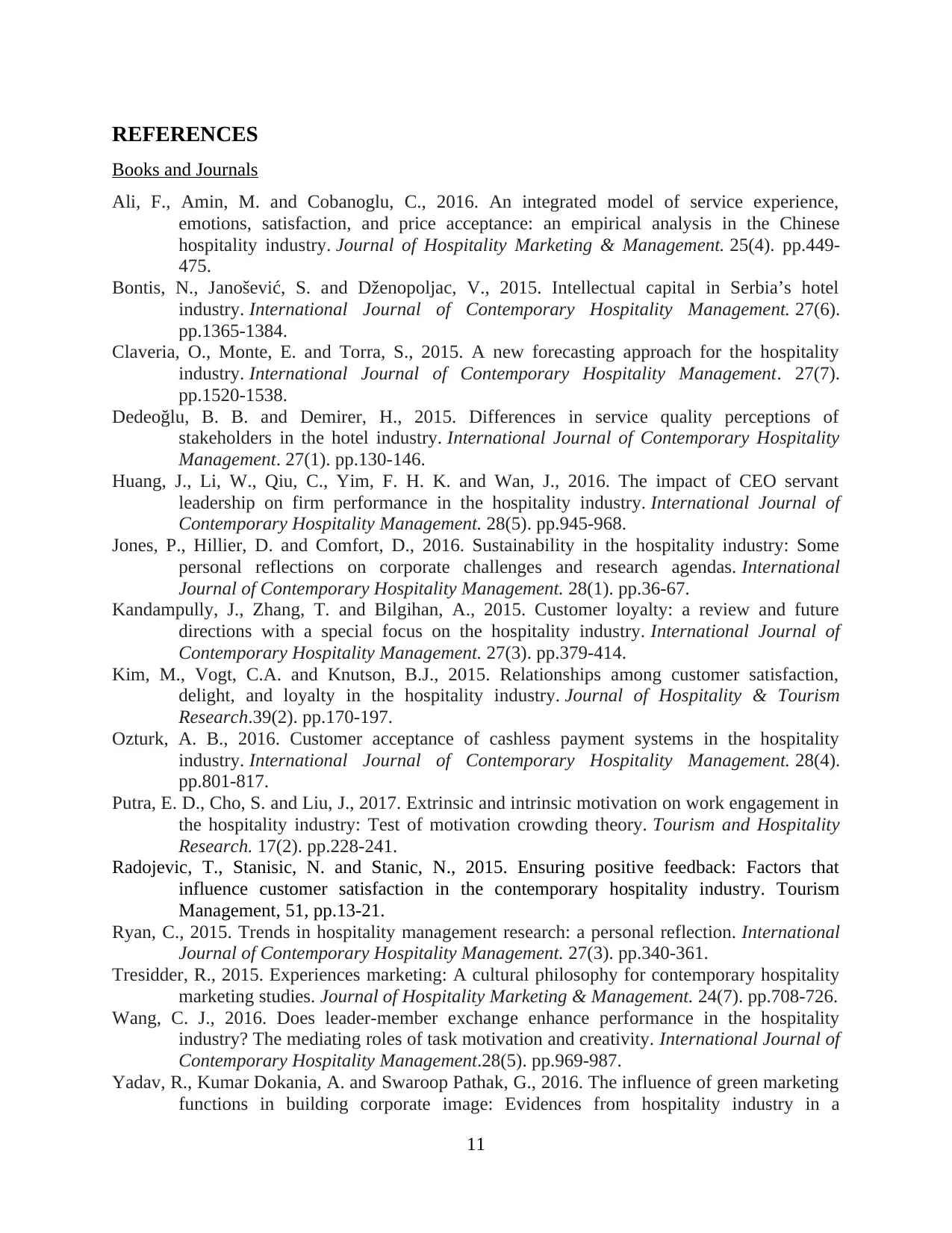
REFERENCES
Books and Journals
Ali, F., Amin, M. and Cobanoglu, C., 2016. An integrated model of service experience,
emotions, satisfaction, and price acceptance: an empirical analysis in the Chinese
hospitality industry. Journal of Hospitality Marketing & Management. 25(4). pp.449-
475.
Bontis, N., Janošević, S. and Dženopoljac, V., 2015. Intellectual capital in Serbia’s hotel
industry. International Journal of Contemporary Hospitality Management. 27(6).
pp.1365-1384.
Claveria, O., Monte, E. and Torra, S., 2015. A new forecasting approach for the hospitality
industry. International Journal of Contemporary Hospitality Management. 27(7).
pp.1520-1538.
Dedeoğlu, B. B. and Demirer, H., 2015. Differences in service quality perceptions of
stakeholders in the hotel industry. International Journal of Contemporary Hospitality
Management. 27(1). pp.130-146.
Huang, J., Li, W., Qiu, C., Yim, F. H. K. and Wan, J., 2016. The impact of CEO servant
leadership on firm performance in the hospitality industry. International Journal of
Contemporary Hospitality Management. 28(5). pp.945-968.
Jones, P., Hillier, D. and Comfort, D., 2016. Sustainability in the hospitality industry: Some
personal reflections on corporate challenges and research agendas. International
Journal of Contemporary Hospitality Management. 28(1). pp.36-67.
Kandampully, J., Zhang, T. and Bilgihan, A., 2015. Customer loyalty: a review and future
directions with a special focus on the hospitality industry. International Journal of
Contemporary Hospitality Management. 27(3). pp.379-414.
Kim, M., Vogt, C.A. and Knutson, B.J., 2015. Relationships among customer satisfaction,
delight, and loyalty in the hospitality industry. Journal of Hospitality & Tourism
Research.39(2). pp.170-197.
Ozturk, A. B., 2016. Customer acceptance of cashless payment systems in the hospitality
industry. International Journal of Contemporary Hospitality Management. 28(4).
pp.801-817.
Putra, E. D., Cho, S. and Liu, J., 2017. Extrinsic and intrinsic motivation on work engagement in
the hospitality industry: Test of motivation crowding theory. Tourism and Hospitality
Research. 17(2). pp.228-241.
Radojevic, T., Stanisic, N. and Stanic, N., 2015. Ensuring positive feedback: Factors that
influence customer satisfaction in the contemporary hospitality industry. Tourism
Management, 51, pp.13-21.
Ryan, C., 2015. Trends in hospitality management research: a personal reflection. International
Journal of Contemporary Hospitality Management. 27(3). pp.340-361.
Tresidder, R., 2015. Experiences marketing: A cultural philosophy for contemporary hospitality
marketing studies. Journal of Hospitality Marketing & Management. 24(7). pp.708-726.
Wang, C. J., 2016. Does leader-member exchange enhance performance in the hospitality
industry? The mediating roles of task motivation and creativity. International Journal of
Contemporary Hospitality Management.28(5). pp.969-987.
Yadav, R., Kumar Dokania, A. and Swaroop Pathak, G., 2016. The influence of green marketing
functions in building corporate image: Evidences from hospitality industry in a
11
Books and Journals
Ali, F., Amin, M. and Cobanoglu, C., 2016. An integrated model of service experience,
emotions, satisfaction, and price acceptance: an empirical analysis in the Chinese
hospitality industry. Journal of Hospitality Marketing & Management. 25(4). pp.449-
475.
Bontis, N., Janošević, S. and Dženopoljac, V., 2015. Intellectual capital in Serbia’s hotel
industry. International Journal of Contemporary Hospitality Management. 27(6).
pp.1365-1384.
Claveria, O., Monte, E. and Torra, S., 2015. A new forecasting approach for the hospitality
industry. International Journal of Contemporary Hospitality Management. 27(7).
pp.1520-1538.
Dedeoğlu, B. B. and Demirer, H., 2015. Differences in service quality perceptions of
stakeholders in the hotel industry. International Journal of Contemporary Hospitality
Management. 27(1). pp.130-146.
Huang, J., Li, W., Qiu, C., Yim, F. H. K. and Wan, J., 2016. The impact of CEO servant
leadership on firm performance in the hospitality industry. International Journal of
Contemporary Hospitality Management. 28(5). pp.945-968.
Jones, P., Hillier, D. and Comfort, D., 2016. Sustainability in the hospitality industry: Some
personal reflections on corporate challenges and research agendas. International
Journal of Contemporary Hospitality Management. 28(1). pp.36-67.
Kandampully, J., Zhang, T. and Bilgihan, A., 2015. Customer loyalty: a review and future
directions with a special focus on the hospitality industry. International Journal of
Contemporary Hospitality Management. 27(3). pp.379-414.
Kim, M., Vogt, C.A. and Knutson, B.J., 2015. Relationships among customer satisfaction,
delight, and loyalty in the hospitality industry. Journal of Hospitality & Tourism
Research.39(2). pp.170-197.
Ozturk, A. B., 2016. Customer acceptance of cashless payment systems in the hospitality
industry. International Journal of Contemporary Hospitality Management. 28(4).
pp.801-817.
Putra, E. D., Cho, S. and Liu, J., 2017. Extrinsic and intrinsic motivation on work engagement in
the hospitality industry: Test of motivation crowding theory. Tourism and Hospitality
Research. 17(2). pp.228-241.
Radojevic, T., Stanisic, N. and Stanic, N., 2015. Ensuring positive feedback: Factors that
influence customer satisfaction in the contemporary hospitality industry. Tourism
Management, 51, pp.13-21.
Ryan, C., 2015. Trends in hospitality management research: a personal reflection. International
Journal of Contemporary Hospitality Management. 27(3). pp.340-361.
Tresidder, R., 2015. Experiences marketing: A cultural philosophy for contemporary hospitality
marketing studies. Journal of Hospitality Marketing & Management. 24(7). pp.708-726.
Wang, C. J., 2016. Does leader-member exchange enhance performance in the hospitality
industry? The mediating roles of task motivation and creativity. International Journal of
Contemporary Hospitality Management.28(5). pp.969-987.
Yadav, R., Kumar Dokania, A. and Swaroop Pathak, G., 2016. The influence of green marketing
functions in building corporate image: Evidences from hospitality industry in a
11
Paraphrase This Document
Need a fresh take? Get an instant paraphrase of this document with our AI Paraphraser
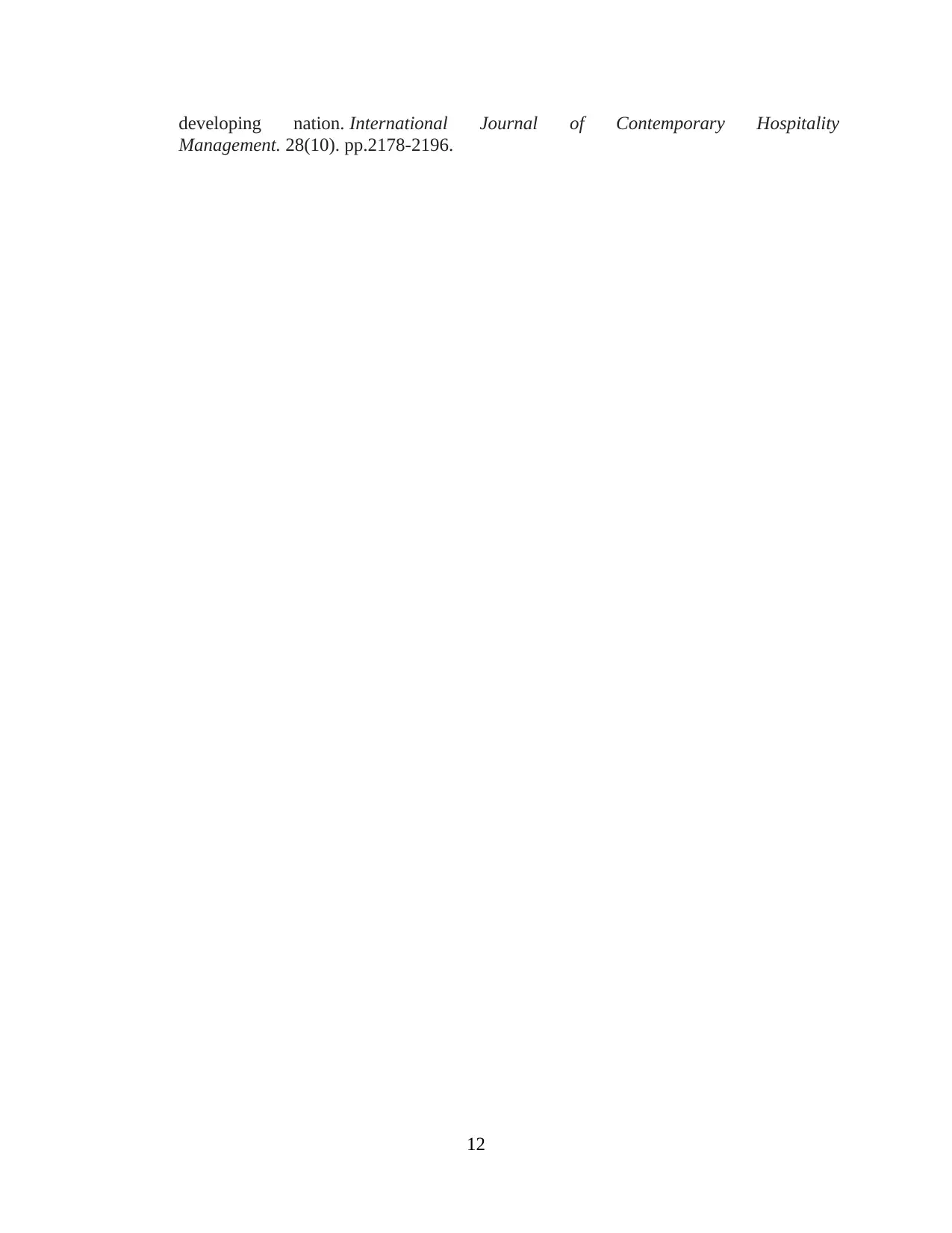
developing nation. International Journal of Contemporary Hospitality
Management. 28(10). pp.2178-2196.
12
Management. 28(10). pp.2178-2196.
12
1 out of 14
Related Documents
Your All-in-One AI-Powered Toolkit for Academic Success.
+13062052269
info@desklib.com
Available 24*7 on WhatsApp / Email
![[object Object]](/_next/static/media/star-bottom.7253800d.svg)
Unlock your academic potential
© 2024 | Zucol Services PVT LTD | All rights reserved.




